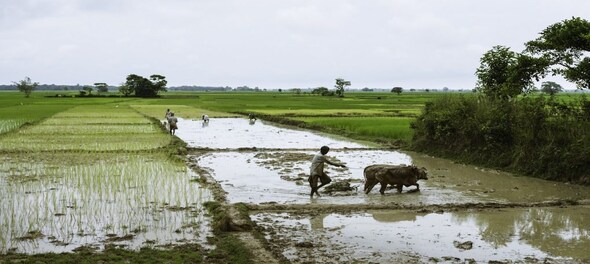
The monsoon seems to have lingered on for a while and Anand Mahindra, Chairperson of Mahindra and Mahindra, has a crucial question to ask that might impact the livelihoods of many.
"Has its (monsoon) cycle shifted permanently? Should farmers be changing the timing of their sowing season?"
The monsoon seems reluctant to bid goodbye. Has its cycle shifted permanently? Should farmers be changing the timing of their sowing season? What are Agri-experts thinking? Our food security may be at stake. Ashok? @agulati115 https://t.co/5JAoZxXyx0
— anand mahindra (@anandmahindra) October 19, 2022
Farmers in Uttar Pradesh suffered heavy crop damage as heavy rainfall continued to pound their farm fields for days. With acres of land inundated, farmers also demanded compensation from the government.
"We put in a lot of money, but all crops have been destroyed due to heavy rainfall. All potato crops were destroyed as well. I would request the government to help us," a farmer was quoted by the news agency ANI as saying.
India is well into October, and there's still no respite from rains in several parts of the country. Harrowing visuals continued to pour in despite the India Meteorological Department (IMD) announcing the withdrawal of the monsoon in mid-September.
Is it an extended monsoon?
GP Sharma, president of Meteorology & Climate Change, Skymet, told CNBCTV18.com that monsoon is invariably getting extended if we see data of the past few years. "The monsoon rains, particularly for the northern parts, are extending beyond the normal dates of withdrawal of monsoon, which has a cascading effect," he said.
ALSO READ | Monsoon withdrawing but October may be the wettest ever — weather expert explains the trend
Explaining the trend, Sharma said that in 2021, the withdrawal had started on October 6, and the month had ended with a surplus of 33 percent.
"Similar thing happened when the withdrawal was on October 9, 2019, and the month ended with a surplus of 45 percent," he said. But when "it was a little early, like in 2018, there was a deficit of in excess of 50 percent".
'Crop harvesting, yield affected'
The extended monsoon is affecting harvesting. "Delayed harvesting is not beneficial for the crop and yield," said GP Sharma. In that case, the quality of the grains also drops.
"In addition, the surplus rainfall during the month of October may cause damage to rice and sugarcane crops in the Haridwar, Dehradun, and Pauri Garhwal districts of Uttarakhand," Professor Ashish Pandey, Department of Water Resources Development & Management, IIT Roorkee, said.
Does this mean farmers need to change their cropping pattern? Experts divided
Tarun Satsangi, AGM-Research-Heading Commodities Research, Origo Commodities India Pvt Ltd, said it is too early to say anything about whether farming patterns should be changed.
"Till now, the monsoon season is from June to September. So, heavy rainfall in one season or two cannot change the planting methodology," he told CNBTV18.com
He added that there's a lack of data on this issue, and it has not yet been ascertained whether a specific region is getting consistent rainfall in October. "We can't be sure of this by just two or three years of data," he said.
However, Sharma had two-three solutions to the problem — either they change the crop or its cycle, or they should have the timings adjusted accordingly.
He explained: "States which are rich in the resources — irrigation, canal arrangement and water bodies — they don't wait for the monsoon rains to come... Only the problem they face is that they don't get the window for harvesting due to heavy rainfall."
"They can sow the seeds a little late. If they cannot do that, they can change the (type of) crop, which has two or two-and-a-half months of cycle," he said.
Pandey was also in favour of shifting farming patters in the wake of changing monsoon trends. "If similar trends continue, the farmers will have to shift their rice transplanting to the month of July instead of the last week of June," he said.
He added that "due to the deficit rainfall during the month of June, field preparation for rice transplanting was delayed which ultimately affected the area of rice transplanting".
First Published: Oct 21, 2022 10:02 AM IST
Check out our in-depth Market Coverage, Business News & get real-time Stock Market Updates on CNBC-TV18. Also, Watch our channels CNBC-TV18, CNBC Awaaz and CNBC Bajar Live on-the-go!


Prajwal Revanna Sexual Assault Case: Activist raises concerns over political interference, delayed investigation in the matter
Apr 30, 2024 10:17 PM
Lok Sabha Election 2024: Baramati election outcome will decide the future of Pawar dynasty, says expert
Apr 30, 2024 10:08 PM
Lok Sabha elections 2024: Baramati to Mainpuri, key battles in phase 3
Apr 30, 2024 7:01 PM

